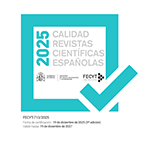De la economía política a la economía pública: José Canga Argüelles
Abstract
The purpose of this essay is to illustrate how classical economics contributed to the breakthrough of new liberal thought of public finances in Spain mainly due to the theoretical contribution and public action of José Canga Argüelles at the turn of 18th Century and the first decades of the 19th Century.
The relation between economics, morality and politics allowed Canga Argüelles to articulate economics and public finances. He conceived a new definition of public finances which establishes a close relationship between wealth and government spending which eases the reorganization of taxation. This new relationship between expenditures and revenues also redefined the public credit through the recognition of all public debts that allowing for a renewal of trust between state, creditors and citizens.
Downloads
Article download
License
In order to support the global exchange of knowledge, the journal Iberian Journal of the History of Economic Thought is allowing unrestricted access to its content as from its publication in this electronic edition, and as such it is an open-access journal. The originals published in this journal are the property of the Complutense University of Madrid and any reproduction thereof in full or in part must cite the source. All content is distributed under a Creative Commons Attribution 4.0 use and distribution licence (CC BY 4.0). This circumstance must be expressly stated in these terms where necessary. You can view the summary and the complete legal text of the licence.
Iberian Journal of the History of Economic Thought is an open access journal that does not charge authors for article processing (submission, review or editing) or publication.









